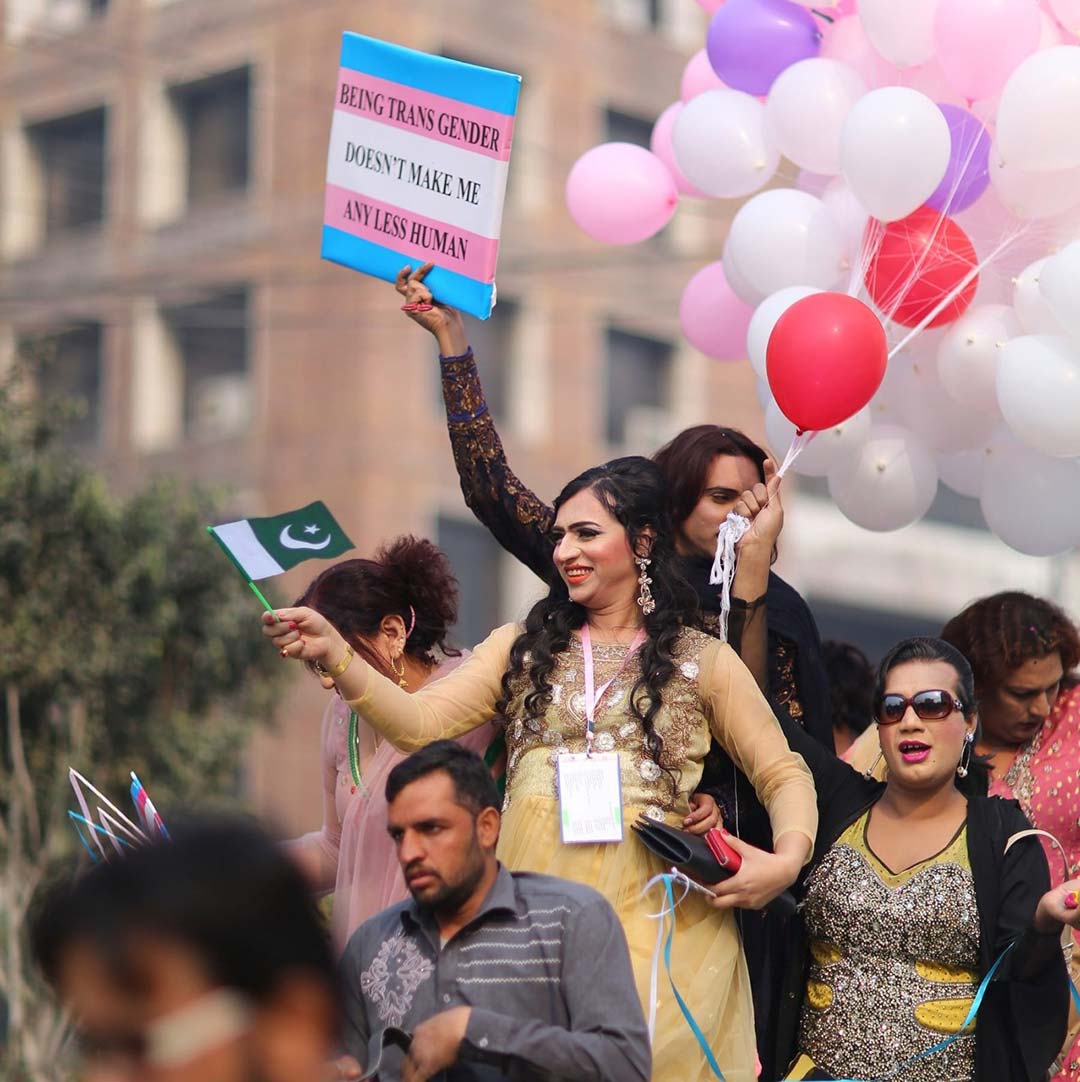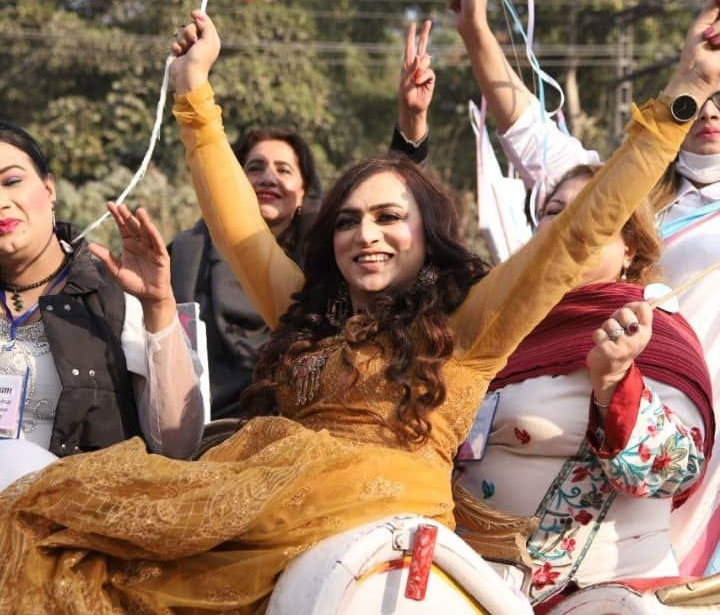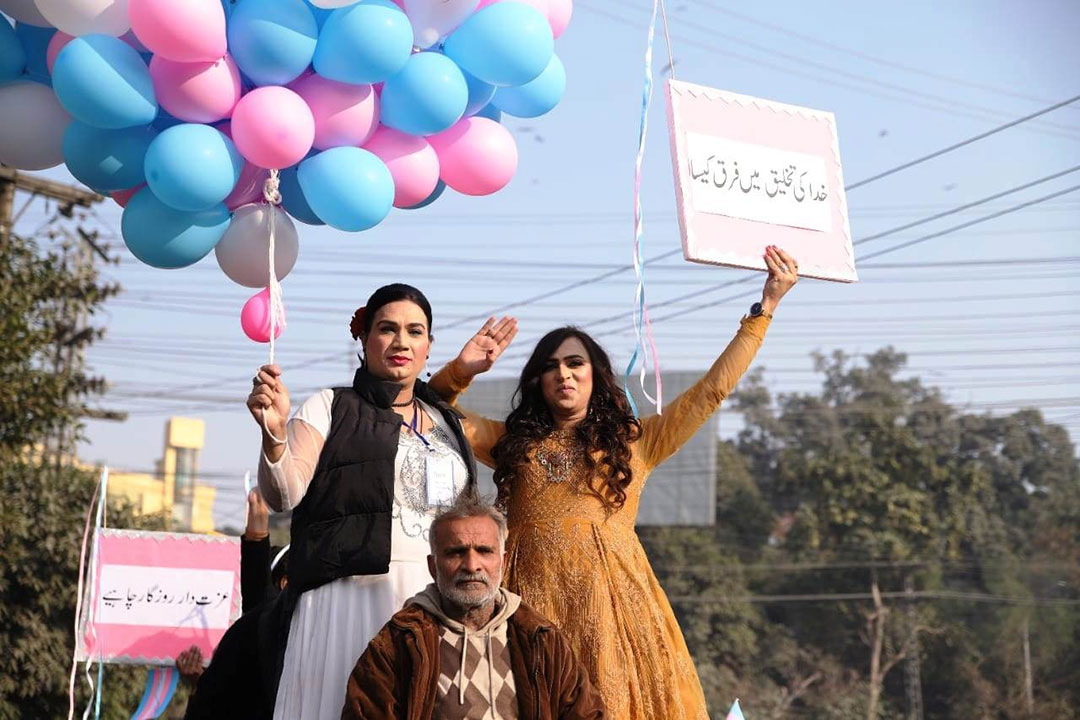COVID-19 means that Pakistani transgender people are even more marginalised
Trans rights organisations such as the Good Thinker Organisation are working to ensure that Pakistan’s transgender community recovers from the hardship that COVID-19 has wrought.
- 6 January 2022
- 4 min read
- by Saadeqa Khan

It is a chilly winter’s night in December 2021 and inside a bungalow in a wealthy area of Lahore, Pakistan, a group of men are awaiting the arrival of transgender dancers. The mood heightens when they arrive, clad in bright dresses. Soon, the men are cheering them on, showering them with money as they dance and perform folk songs.
“The main hindrance is that this cash grant is only provided to those registered in Pakistan’s national database as transgender. Due to high discrimination and hatred towards this community in Pakistan, most of them prefer to be registered as male or female rather than a third identity.”
Dance events such as these, as well as weddings, and birthdays are the primary source of income for trans women in Lahore.

Credit: Saadeqa Khan
“We get 3,000 rupees (US$ 16.80) for a dance performance, whereas we get paid more – 10,000 rupees ($ 56) – to have sex over a night,” says 30-year-old Parveen, a trans woman who lives in Lahore.
“I can’t stop thinking about the days when I didn’t have a single penny to buy food during the COVID-19 lockdown. Weddings were cancelled, and the government restricted large gatherings afterward, forcing my housemates and I to choose between feeding ourselves or keeping a roof over our heads,” says 26-year-old Sarah.
Sarah lives in an urban slum with a group of transgender people, all illiterate and unemployed, mainly dependent on dancing for income.

Credit: Saadeqa Khan
“In such small houses under non-sanitary conditions, it was nearly impossible to maintain social distancing. Due to greater vulnerability to COVID-19, people are afraid to interact with us. My landlord ordered me to evacuate the house when I tested positive for COVID-19 last July,” Sarah says.
“He was eventually convinced to change his mind and allowed me to stay after a few well-educated neighbours talked to him at my behest.”
Have you read?
Economic insecurity affecting the most marginalised
Transgender people are a marginalised community in Pakistan. Most of them experience family rejection and homelessness in adolescence. They live under the fear of economic insecurity, and the pandemic has worsened the situation, mainly due to the reduced working opportunities.
According to a recent survey conducted in the three cities of Lahore, Rawalpindi, and Islamabad, most trans women rely on begging. Around 8% work as dancers and 9% as sex workers.
To address the impact of the pandemic in the country, Prime Minister Imran Khan announced a PKR 8 billion relief package. Under its Ehsaas Cash Programme, PKR 12,000 ($ 67.20) was provided to the people whose income was severely impacted due to lockdown or social distancing.
“The tragedy is that under Ehsaas Cash Programme, only 3% of the transgender people could get financial assistance,” says Waqas Abid. Abid is a lawyer by profession and founder of Good Thinker Organisation (GTO), which works to protect the trans community's rights in Pakistan.
“The main hindrance is that this cash grant is only provided to those registered in Pakistan’s national database as transgender. Due to high discrimination and hatred towards this community in Pakistan, most of them prefer to be registered as male or female rather than a third identity,” says Abid.

Credit: Saadeqa Khan
“GTO recently conducted research work, covering Lahore and adjoining areas, focusing on grass-root solutions for the long-standing problems of Pakistan’s transgender community. Due to COVID-19, they have suffered even more, but we tried to help them with all available resources.
“Based on this research, GTO formed a transgender rights protection network that includes social activists, lawyers, media persons, and trans community members. This network aims to add the trans community in provincial law for better legislation for the protection of their rights,” he adds.
In Pakistan, this marginalised community has been severely neglected. The intention is to work with the government and other NGOs to develop entrepreneurial capacities for trans people, provide access to microcredit services and a 24/7 helpline to immediately rescue them in any crisis.
More from Saadeqa Khan
Recommended for you









